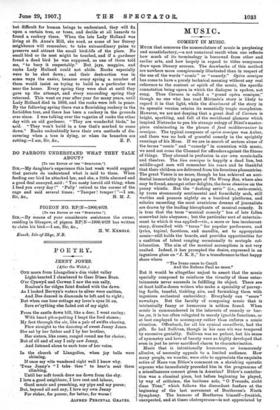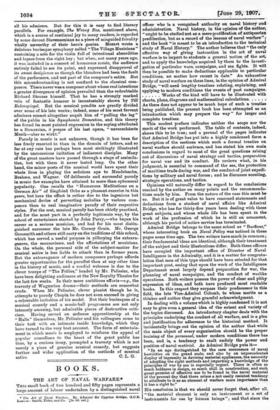M USI C.
COMEDY IN MUSIC.
MUCH that concerns the nomenclature of music is perplexing and unsatiafactory,—a not unnatural result when one reflects how much of its terminology is borrowed from other and earlier arts, and how largely in regard to titles composers draw upon literary sources. The drawbacks of this method are nowhere more conspicuously illustrated than in respect of the use of the words "comic". or "comedy." Opera .comique has come to have a purely technical meaning without any real reference to the content or spirit of the music, the specific connotation being opera in which the dialogue is spoken, not sung. Thus Carmen is called a "grand opera comique," though no one who has read Merimee's story is likely to regard it in that light, while the cinnment of the story in its operatic version retains its essentially tragic complexion. However, we are not denying that a great deal of Carmen is bright, sparkling, and full of the meridional glamour which inspired Nietzsche to pen his strange eulogy of Bizet's master- piece culminating in the phrase if lout Tnediferraniser la musigue. The typical composer of opera comique was Auber, and there was no lack of graceful comedy in the sprightly runnings of his Muse. If we are in search of serious abuse of the terms " comic " and "comedy" in connexion with music, we need not cross the Channel for offenders against the fitness of things. They abound in profusion in our own music-halls ana theatres. The lion comique is happily a dead lion, but middle-aged men will remember his roars and be thankful that their children are delivered from his ferocious pleasantries. The great Vance is no more, though he has achieved an acci- dental immortality in the pages of The Wrong Box, where also may be found, amongst other delights, the locus classic= on the penny whistle. But the "dashing seri° " (i.e., serio.comic), by turns strenuously sentimental and formidably arch, still warbles and prances nightly on a hundred -platforms, and salaries exceeding the most avaricious dreams of journalists are drawn by the leading hierophants of musical comedy. It is true that the term "musical comedy" has of late fallen somewhat into abeyance ; but the particular sort of entertain- ment to which it was applied—viz., a more or less incoherent story, diversified with " turns " for popular performers, and lyrics, topical, facetious, and maudlin, set to appropriate music—still holds the boards, and provides opportunities for a coalition of talent ranging occasionally to sextuple col- laboration. The aim of the musical accomplices is not very exalted. Indeed, it has prompted the desire, expressed in an ingenious gloss on "J. K. S.," for a transference to that happy shore where
"The Ivens cease to Caryll And the Rubens Paul no more."
But it would be altogether unjust to assert that the music specially composed to reinforce the vivacity of these enter- tainments never succeeds in fulfilling its object. There are at least half-a-dozen writers who make a speciality of purvey- ing facile, tuneful, tinkling airs, and furnishing them with ingenious orchestral embroidery. Everybody can "score" nowadays. But the faculty of composing music that is intrinsically funny or humorous is seldom found. When music is commandeered in the interests of comedy or bur- ies ine, it is too often relegated to merely ignoble functions, or at best employed to accompany rather than enforce a comic situation. Offenbach, for all his cynical canailleiie, had the gift. So had Sullivan, though in his case wit was tempered by excessive geniality. Sullivan was no pedant, but his sense of symmetry and love of beauty were so highly developed that even in jest he never sacrificed charm to characterisation.
Music that is intentionally humorous, or humorously allusive, of necessity appeals to a limited audience. How many people, we wonder, were able to appreciate the exquisite satire of Hans von Bfilow's comment on a shrieking operatic soprano who immediately preceded him in the programme of a miscellaneous concert given in America? Billow's contribu- tion was a classical piece, but before beginning he played, by way of criticism, the baritone solo, "0 Freunde, nicht diese Tone," which follows the discordant fanfare at the beginning of the last movement of Beethoven's Ninth Symphony. The humour of Beethoven himself—freakish, unexpected, and at times obstreperous—is not appreciated by
all his admirers. But for this it is easy to find literary parallels. For example, The Wrong Box, mentioned above, which is a source of continual joy to many readers, is regarded by some devout Stevensoniant es a piece of misguided frivolity wholly unworthy of their hero's genius. Mozart wrote a delicious burlesque symphony called "The Village Musicians" containing a solo for the violin full of intentional absurdities and lapses from the right key ; but when, not many years ago, it was included in a concert of humorous music, the audience entirely failed to see its point, and expressed disapproval of its sweet desipience us though the blunders had been the fault of the performers, and not part of the composer's satire. But this misunderstanding is not confined to the classical com- posers. There never was a composer about whose real intentions' a greater divergence of opinion prevailed than the redoubtable Richard Strauss himself. That he has a strongly marked vein of fantastic humour is incontestably shown. by Till Bulensp'egel. But the musical pundits are greatly divided over some of his late works ; indeed, some of his most fervent admirers cannot altogether acquit him of "pulling the leg" of the public in his Symphonic Domestica, and this theory has found its most pointed expression in the saying attributed to a Straussian, ci propos of his last opera, " unverschamte Musik—aber es wirkt."
Parody in music is not unknown, though it has been far less freely resorted to than in the domain of letters, and so far at any rate has perhaps been most strikingly illustrated by the unconscious imitation of indiscreet disciples. Many of the great masters have passed through a stage of assimila- tion, but with them it never lasted long. On the other hand, the minor poets of the musical world have spent their whole lives in playing the sedulous ape to Mendelssohn, Brahma, and Wagner. Of deliberate and successful uarody in music few examples have attained to more than ephemeral popularity. One recalls the "Humorous Meditations on a German Air" of Siegfried Ochs as a pleasant exercise in this genre, but here the effect is rather due to the ingenious but mechanical device of perverting melodies by various com- posers than to real imaginative parody of their respective styles. For the rest, musical parody has been chiefly practised, and for the most part in a perfectly legitimate way, by the school of entertainers started by John Parry,—who began his career as a serious musician, and had for his most distin- guished successor the late Mr. Corney Grain. Mr. George Grossmith and others still carry on the traditions of this school, which has served a useful purpose in pillorying the extrava- gances, the mannerisms, and the affectations of musicians. On the whole, the personal side of the subject-matter for musical satire is less liable to attack than in former years. But the extravagance of modern composers perhaps affords greater opportunities for the parodist than at any other time in the history of music, and a cordial welcome is due to the clever troupe of "The Follies," headed by Mr. Pelissier, who have been delighting audiences at the New Royalty Theatre for the last few weeks. In their more ambitious efforts—e.g., the travesty of Wagnerian drama—their methods are somewhat crude. When Mr. Pelissier, clever pianist though he is, attempts to parody Chopin he does not even succeed in giving a colourable imitation of his model. But their burlesques of a musical comedy and a music-hall programme are not only intensely amusing, but admirable pieces of destructive criti- cism. Having served an arduous apprenticeship at the "Halls" themselves, Mr. Pelissier and his colleagues come to their task with an intimate inside knowledge, which they have turned to the very best account. The form of entertain- ment in which music is employed to reinforce the appeal of popular comedians to the heart of the great public has thus, by a curious irony, prompted a travesty which is not merely a, piece of genuine musical comedy, but suggests further and wider application of the methods of musical

















































 Previous page
Previous page